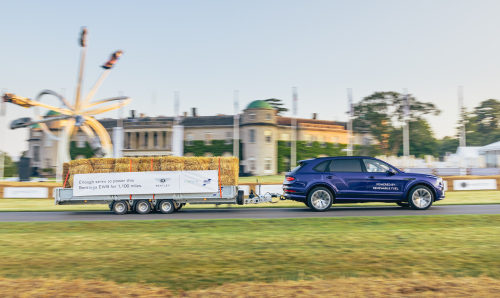Bentley ran its six-strong fleet at Goodwood using the fuel and successfully completed all 32 hill-climbs. The 750PS, W12-engined Batur fueled with the second-gen biofuel completed a 55.0 second run putting it in the top-three production cars of the weekend. Bentley’s newest flagship—the Bentayga EWB—also completed the hill climb in just 1 minute 21 seconds—impressive enough, but made even more surprising by the fact it was towing 2.5 tonnes of straw. Enough straw, that when converted to biofuel, would power the Bentayga for 1100 miles or provide fuel for all of the Bentleys for the weekend at Goodwood.

The biogasoline conforms to the global EN228 standard for gasoline, meaning that it’s a straightforward replacement for normal pump fuel. No engine modifications are necessary, even for the oldest surviving Bentley, the 1920 EXP2. Any Bentley ever built will run as powerfully and smoothly on the second-generation biofuel as it does on normal pump gasoline, while dramatically reducing its carbon footprint.
During the production process, waste biomass is broken down using fermentation, leading to the creation of ethanol. Dehydration of the ethanol converts it to ethylene, which can then be transformed into gasoline through the process of oligomerisation—chaining short hydrocarbon molecules together to produce longer, more energy-dense ones.
The fuel produced is 100% renewable and delivers an estimated 85% reduction in CO2 impact compared with conventional gasoline. By using waste materials that would otherwise be disposed of, second-generation biofuel avoids the ‘food versus fuel’ dilemma associated with first-generation biofuels.
Bentley’s Beyond100 strategy will see the company line up switch to exclusively plug-in hybrid or battery electric vehicles by 2026, and full electric vehicles only by 2030; key milestones in its journey to become an end-to-end carbon neutral organisation as it embarks on its second century. However, the company is also committed to supporting all current and past vehicles.
An estimated 84% of all Bentleys ever built are still running today, their longevity an example of sustainability. For these models, second-generation biofuel represents one route to a more sustainable future.